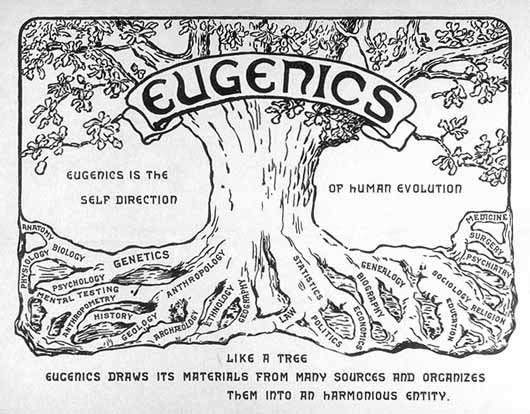One of Tesla’s most disturbing ideas was his belief in using eugenics to purify the human race.Of course, this statement is framed in the modern "correct" view, because it is clearly colored by the Nazi atrocities that followed those decades, and from which everyone invariably wishes to distance themselves.
Unfortunately, I expect that this belief in eugenics is far more prevalent than most people would comfortably wish it to be (1).
One of the 21st century's dressed up version of eugenics is embodied by the transhumanist movement, where the distancing is maintained by pretending as if technology can be neutral enough to achieve this "purity".
Further this is already hinted at by the thought that we may be able to genetically engineer "superior" offspring. Of course, these ideas are all couched in the altruistic verbage of conquering debilitating diseases, and eliminating defects.
However, it is eugenics all the same. This is the inevitable result of scientific thinking without philosophical tempering (2).
The belief is fostered by accepting our own social view that an individual should strive to improve themselves and be the "best that they can be". It promotes everything from the work ethic to the ideas of how to court success.
It takes little to shift this argument to suggest that perhaps the human race itself can be improved with a little judicious use of technology. After all, how can improving someone genetically be a problem. Isn't it our ethical duty to make things better?
Who would argue that criminals are evolutionarily desirable for the future? Who would argue that those suffering serious genetic defects are doing any favors for future generations?

All of these rationalizing arguments are readily accepted by many individuals because of two fundamental flaws in our thinking. The first is that we think we understand what it means to "improve" a human. We simply take the traits we find favorable and automatically presume that this is an evolutionary positive direction to take, despite our overwhelming ignorance of the consequences of such evolutionary choices. It is quite typical human hubris to view a system that has flourished for hundreds of millions of years [or even the few million years of primate evolution] and simply presume that we know better.
Certainly, some may argue that we have plenty of evidence from our experiences in animal domestication, yet who would claim that these results are an improvement of the original species? The modifications have made these animals more compliant with human demands, but improved the original species?
The second flaw is in maintaining the illusion that WE are OK, and that such choices are only legitimately going to be forced on OTHERS. It never occurs to any of the eugenics advocates that perhaps THEY are the ones that will need to be eliminated.
The problem is that given a choice, humans will converge to species homogeneity. If there is a means, then everyone will strive for the same results, in the illusory effort to garner as many opportunities for success as are possible. Of course, such success is impossible to achieve, since [given the opportunity] everyone would presume to have it. So instead of recognizing the scientifically responsible position that diversity is what promotes the species, we would strive for sameness.
None of this is an argument against helping people. Technological advances can be beneficial to alleviate all manner of problems that individuals face. This is not some "nature" argument that we should simply revert back to the lifestyle of our ancestral hunter-gatherers. However, it should also be clear that helping people is not the same as determining what kind of people we will create for the future.
For those that would argue that eugenics is not a modern scientific consideration, it is useful to consider that 21st century engenics has much better PR. By focusing on positive outcomes, it seeks to avoid the obvious assertion that current individuals are deficient. By promoting the creation of technological super-humans, it denies the obvious inequalities that such a situation would create. Instead, focusing on the presumption of altruism that has never existed among humans. Modern society can barely tolerate the idea of individuals having free and ready access to solve the medical problems they face. Yet we're to believe that they will have free and ready access to augmentation technologies to improve intelligence and longevity?
Despite the fact that unconstrained population growth is clearly an ongoing problem [if not THE primary problem], we prefer to ignore that, arguing with platitudes of "who is going to determine how many children someone can have". Yet, apparently it's not a problem to argue that someone can determine what kind of children you have. In fact, some such arguments are already taking the position that we have an ethical responsibility to do the best that we can for future generations.
He believed that by the year 2100 eugenics would be “universally established” as a system of weeding out undesirable people from the population.Perhaps Tesla was correct after all.
-------------------------------------
(1) It is interesting to read the comments following the article for a perspective on this point.
(2) Of course, given some of the philosophical nonsense that exists around these ideas, I'm beginning to think that this may actually exacerbate the problems than resolve them.



Comments